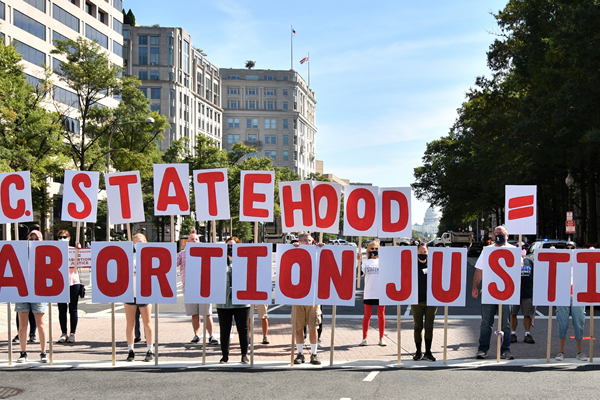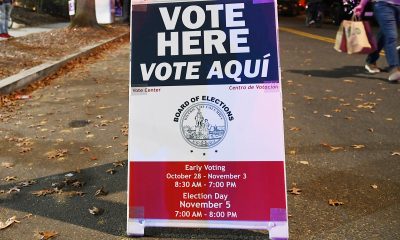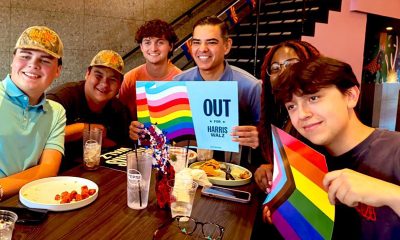National
Legal advocates turn attention to Supreme Court abortion cases
No major LGBTQ rights cases before court this term

With the new term for the U.S. Supreme Court underway, justices for the first time in years won’t have to consider a major case specifically impacting LGBTQ rights, which legal advocates say will lead to them to focus their attention on high-profile cases that challenge a woman’s right to access abortion.
At the top of the watch list for court, which now has 6-3 conservative majority as a result of appointments under former President Trump, is Dobbs v. Jackson Women’s Health Organization, which will determine the constitutionality of the Mississippi law banning abortion after 15 weeks and is widely considered a direct challenge to long-standing precedent established by Roe v. Wade guaranteeing a right to abortion. The Texas law banning any abortion after six weeks, which the Supreme Court allowed to take effect as litigation against it proceeds, is still pending in lower courts, but will likely reach the high court soon.
For many LGBTQ legal advocates, the abortion cases are important because they say the outcome could directly impact legal precedent underpinning major Supreme Court decisions in favor, including the 2003 decision of Lawrence v. Texas, which struck down state bans on sodomy, and the 2015 decision of Obergefell v. Hodges in favor of same-sex marriage nationwide.
Camilla Taylor, director of constitutional litigation for Lambda Legal, said the outcome abortion cases is crucial not only because LGBTQ people need access to abortion.
“Just as importantly, there are a lot of ways in which the landmark precedents that we obtained that vindicate the rights of LGBT people rely upon a foundation of substantive due process precedent that includes Roe v. Wade, and other cases dealing with reproductive health,” Taylor said. “So, if Roe versus Wade crumbles, then the foundation on which our own cases also crumbles.”
As such, a coalition of LGBTQ legal groups—including the National Center for Lesbian Rights, the National Center for Transgender Equality and Equality California—was among those who filed a friend-of-the-court brief in September arguing the Mississippi law is unconstitutional.
Key among the arguments is the denial of abortion access is a form of sex discrimination, just as the Supreme Court determined last year in Bostock v. Clayton County that anti-LGBTQ discrimination is a form of sex discrimination, this illegal under the Civil Rights Act of 1964.
“By the same logic, laws that restrict abortion also facially discriminate based on sex,” the brief says, “Like being LGBTQ, pregnancy is a sex-based characteristic; it is ‘inextricably bound up with’ an individual’s sex. Accordingly, laws that force a pregnant woman to bear a child necessarily discriminate based on sex, as would a law that barred a reproductive medical procedure available only to men.”
It’s true that both Roe v. Wade and the Supreme Court’s decision for LGBTQ were based on principals of due process and equal protection under the 5th and 14th Amendments of the U.S. Constitution. But not all legal experts agree LGBTQ rights are on the line depending on the outcome of abortion litigation.
Dale Carpenter, a conservative law professor at the SMU (Southern Methodist University) Dedman School of Law who’s written in favor of LGBTQ rights, said the Supreme Court is “probably going to write a narrower opinion, if it even overrules Roe,” but won’t issue a radical decision “that reaches out and destroys all unenumerated rights.”
“Obergefell relies on the fundamental right to marry,” Carpenter said. “There’s no chance the Supreme Court is going to say there is no right to a fundamental right to marry. The doctrine upon which Obergefell rests is on much more solid footing than abortion rights. The basic doctrine underlying Obergefell has never seriously been challenged; abortion rights have been for 50 years.”
Other key differences between the right to abortion and same-sex marriage, Carpenter said, are an arguable state interest in protecting fetal life and reliance interests in the case of marriage rights given thousands of same-sex couples have wed in the wake of the Obergefell decision.
But what about Lawrence v. Texas, which were both that LGBTQ rights decision and Roe v. Wade decided at least in part on finding an unenumerated right to privacy in the constitution? Carpenter said a Supreme Court decision undoing a right to privacy would mean undoing nearly 60-year precedent that began with the 1965 decision in Griswold v. Connecticut, which overturned a state ban on contraceptives.
“There’s not even a single brief in the case, that I know of, on the anti-abortion side that’s supporting that,” Carpenter said.
Carpenter concluded with a wry jab: “By the way, the LGBT rights advocates who are now saying that these LGBT rights decisions are in danger will be the same people say after Roe is a overruled that those decisions are not affected.”
Indeed, the Supreme Court under its current 6-3 conservative makeup had an opportunity to take up an Indiana birth certificate case, Box v. Henderson, that was a direct challenge to the Obergefell marriage decision, but declined to take up the case. No state is any where close to recriminalizing sexual relations for same-sex couples, which in 2021 would widely be seen as a human rights violation.
But legal advocates for the LGBTQ community aren’t limiting the relationship between abortion and LGBTQ rights to legal principles. Additionally, the identify solidarity with another minority group under siege, in this case women seeking access to abortion, and need among certain members of the LGBTQ community—lesbian and bisexual women, transgender men and non-binary people—to have the access to abortion.
Shannon Minter, legal director for the National Center for Lesbian Rights, echoed the sense LGBTQ legal advocates are focused on abortion cases, but cited “overlap between the reproductive rights, and justice movement and the LGBTQ movements.”
“What we see is the primary impact of this case on our community is a very direct one,” Minter said. “It’s extremely direct. The ability to obtain abortions is of great importance to women in our community, and also to transgender men and non-binary people as well.”
Minter cited data finding upwards of 80 percent of bisexual women will experience pregnancy over their lives and said LGBTQ women “are significantly more likely to have unintended pregnancies as a result of sexual violence, which is very distressing, but that is a reality for our community.”
Lesbian young adults and adolescents are at particular risk for unwanted pregnancy, Minter added, because there’s still “so much stigma and discrimination that they tried to sort of hide their sexual orientation, and prove that they’re straight when they’re not, so they actually have high rates of unprotected sex.”
Religious schools funding, gun control, Obamacare on docket
The abortion cases aren’t the only litigation on the radar for LGBTQ legal advocates. Also on the list are cases that will determine whether Maine religious schools have access to public funds, the legality of New York State gun regulations and disparate impact claims under Obamacare.
Taylor said the case of CVS Pharmacy v. Doe before the Supreme Court, which was brought by people living with HIV/AIDS, will determine whether disparate impact claims are cognizable in the context of disabilities under the Affordable Care Act.
“That’s really important for people living with HIV and other people with disabilities,” Taylor said. “It could do a lot of harm.”
The oral arguments in the Dobbs case are set to take place before the Supreme Court on Dec. 1.
New York
Pride flag raised at Stonewall after National Park Service took it down
‘Our flag represents dignity and human rights’

A Pride flag was raised at the site of the Stonewall National Monument days after a National Park Service directive banned flying the flag at the birthplace of the LGBTQ rights movement in the U.S.
The flag-raising was led by Manhattan Borough President Brad Hoylman-Sigal and supported by other elected officials.
“The community should rejoice. We have prevailed,” Hoylman-Sigal said shortly after the flag was hoisted. “Our flag represents dignity and human rights.”
The flag now sits in Christopher Street Park, feet away from the Stonewall Inn, where in 1969 a police raid of the gay bar sparked outrage and led to a rising of LGBTQ people pushing back on NYPD brutality and unjust treatment.
Elected officials brought a new flagpole with them, using plastic zip ties to attach it to the existing pole.
In 2016, President Barack Obama declared the site a national monument.
One day before the planned re-raising of the Pride flag, the National Park Service installed only an American flag on the flagpole, which days prior had flown a rainbow flag bearing the NPS logo.
The directive removing the flag was put forward by Trump-appointed National Park Service Acting Director Jessica Bowron.
This comes one day after more than 20 LGBTQ organizations from across the country co-signed a letter to Interior Secretary Doug Burgum and General Services Administrator Ed Forst, demanding the flag be restored to the monument.
“It is our understanding that the policy provides limited exceptions for non-agency flags that provide historical context or play a role in historic reenactments. Simply put, we urge you to grant this flag an exception and raise it once again, immediately,” the letter read. “It also serves as an important reminder to the 30+ million LGBTQ+ Americans, who continue to face disproportionate threats to our lives and our liberty, that the sites and symbols that tell our stories are worth honoring … However, given recent removals of the site’s references to transgender and bisexual people — people who irrefutably played a pivotal role in this history — it is clear that this is not about the preservation of the historical record.”
The letter finished with a message of resilience the LGBTQ community is known for: “The history and the legacy of Stonewall must live on. Our community cannot simply be erased with the removal of a flag. We will continue to stand up and fight to ensure that LGBTQ+ history should not only be protected — it should be celebrated as a milestone in American resilience and progress.”
When asked about the directive, the NPS responded with this statement:
“Current Department of the Interior policy provides that the National Park Service may only fly the U.S. flag, Department of the Interior flags, and the Prisoner of War/Missing in Action flag on flagpoles and public display points. The policy allows limited exceptions, permitting non-agency flags when they serve an official purpose. These include historical context or reenactments, current military branch flags, flags of federally recognized tribal nations affiliated with a park, flags at sites co-managed with other federal, state, or municipal partners, flags required for international park designations, and flags displayed under agreements with U.S. Citizenship and Immigration Services for Naturalization ceremonies.”
An Interior Department spokesperson on Thursday called the move to return the flag to the monument a “political stunt.”
“Today’s political pageantry shows how utterly incompetent and misaligned the New York City officials are with the problems their city is facing,” a department spokesperson said when reached for comment.
The clash comes amid broader efforts by the Trump-Vance administration to minimize LGBTQ history and political power. The White House has spent much of President Donald Trump’s second presidency restricting transgender rights — stopping gender-affirming care for transgender youth, issuing an executive order stating the federal government will recognize only two sexes, male and female, and blocking Medicaid and Medicare from being used for gender-affirming care.
State Department
FOIA lawsuit filed against State Department for PEPFAR records
Council for Global Equality, Physicians for Human Rights seeking data, documents

The Council for Global Equality and Physicians for Human Rights have filed a Freedom of Information Act lawsuit against the State Department for PEPFAR-related data and documents.
The groups, which Democracy Forward represents, filed the lawsuit in U.S. District Court for the Southern District of New York on Wednesday.
Then-President George W. Bush in 2003 signed legislation that created PEPFAR. UNAIDS Executive Director Winnie Byanyima last March said PEPFAR has saved 26 million lives around the world.
The Trump-Vance administration in January 2025 froze nearly all U.S. foreign aid spending for at least 90 days. Secretary of State Marco Rubio later issued a waiver that allowed PEPFAR and other “life-saving humanitarian assistance” programs to continue to operate during the freeze.
The Washington Blade has previously reported PEPFAR-funded programs in Kenya and other African countries have been forced to suspend services and even shut down because of gaps in U.S. funding. HIV/AIDS activists have also sharply criticized the Trump-Vance administration over reported plans it will not fully fund PEPFAR in the current fiscal year.
The lawsuit notes the Council for Global Equality and Physicians for Human Rights have “filed several FOIA requests” with the State Department for PEPFAR-related data and documents. The groups filed their most recent request on Jan. 30.
“On Jan. 30, 2026, plaintiffs, through counsel, sent State a letter asking it to commit to prompt production of the requested records,” reads the lawsuit. “State responded that the request was being processed but did not commit to any timeline for production.”
“Plaintiffs have received no subsequent communication from State regarding this FOIA request,” it notes.
“Transparency and inclusion have been hallmarks of PEPFAR’s success in the last decade,” said Beirne Roose-Snyder, a senior policy fellow at the Council for Global Equality, in a press release that announced the lawsuit. “This unprecedented withholding of data, and concurrent ideological misdirection of foreign assistance to exclude LGBTQI+ people and others who need inclusive programming, has potentially devastating and asymmetrical impacts on already marginalized communities.”
“This data is vital to understanding who’s getting access to care and who’s being left behind,” added Roose-Snyder.
“We filed this lawsuit to seek transparency: the administration’s PEPFAR data blackout withholds information the public, health providers, and affected communities need to track the HIV epidemic and prevent avoidable illness and death, obscuring the true human cost of these policy decisions,” said Physicians for Human Rights Research, Legal, and Advocacy Director Payal Shah.
The State Department has yet to respond to the Blade’s request for comment on the lawsuit.
New York
N.Y. lawmaker vows ‘Pride flag will fly again’ at Stonewall Monument
After a Jan. 21 policy shift, Pride flags were banned at national parks, prompting backlash from Bottcher and LGBTQ advocates.

Hours after news broke that the National Park Service would no longer allow Pride flags to fly at the Stonewall National Monument — the birthplace of the modern LGBTQ rights movement in the United States — the Washington Blade spoke with New York State Sen. Erik Bottcher, who represents the area surrounding the Stonewall Inn and the national monument.
During the interview, Bottcher, who is gay, spoke about the policy change and outlined steps he plans to take in the coming days to push for its reversal.
“This is another act of erasure,” Bottcher told the Blade. “It’s a cowardly attempt to rewrite history and to intimidate our community. This is Stonewall — it’s where we fought back, where we ignited a global movement for equality — and we refuse to go back. We’re not going to accept these acts of erasure.”
The Stonewall Inn became a flashpoint in 1969 after NYPD officers raided the bar, part of a longstanding pattern of police harassment of LGBTQ spaces. The raid sparked days of protest and resistance along Christopher Street, now widely recognized as the catalyst for the modern LGBTQ rights movement.
While the events are often referred to as the “Stonewall Riots,” many activists and historians prefer the term “Stonewall Uprising,” emphasizing that the resistance was a response to systemic oppression rather than senseless violence. LGBTQ patrons and community members fought back — shouting “Gay Power!” and “Liberate Christopher Street!” — as crowds grew and frustration with police abuse boiled over.
Since the uprising, LGBTQ people and allies have gathered annually in June to commemorate Stonewall and to celebrate Pride, honoring the movement that placed LGBTQ voices at the center of the fight for equality.
In June 2016, then President Barack Obama officially designated the space as the Stonewall National Monument, making it the United States’s first national monument designated for an LGBTQ historic site.
Now, nearly 10 years later, President Trump’s appointed NPS acting director Jessica Bowron changed policy on Jan. 21 regarding which flags are allowed to be flown in national parks. Many, including Bottcher, say this is part of a larger targeted and deliberate attempt by the administration to erase LGBTQ history.
“It’s clear they’re making a conscious decision to erase the symbols of our community from a monument to our community’s struggle,” he said. “This is a calculated and premeditated decision, and it could be — and should be — reversed.”
“Let’s be clear,” Bottcher added, “they wish we didn’t exist … But we’re not going anywhere. We refuse to go back into the shadows.”
When asked why it is critical to challenge the policy, Bottcher emphasized the importance of visibility in preserving LGBTQ history.
“This is why it’s so important that we not let this stand,” he said. “Visibility is critical. When people see us, learn about us, and get to know us, that’s how we break down prejudice and stereotypes. We cannot allow them to push us back into the shadows.”
Other LGBTQ leaders and elected officials were quick to condemn the removal of the Pride flag, which had flown since the site’s official designation as a national monument.
New York City Mayor Zohran Mamdani called the decision “outrageous.”
“I am outraged by the removal of the Rainbow Pride Flag from Stonewall National Monument,” Mamdani said in a statement. “New York is the birthplace of the modern LGBTQ+ rights movement, and no act of erasure will ever change or silence that history.”
“Our city has a duty not just to honor this legacy, but to live up to it,” he added. “I will always fight for a New York City that invests in our LGBTQ+ community, defends their dignity, and protects every one of our neighbors — without exception.”
Senate Minority Leader Chuck Schumer also condemned the move.
“The removal of the Pride Rainbow Flag from the Stonewall National Monument is a deeply outrageous action that must be reversed immediately,” Schumer said in a statement to The Advocate. “Stonewall is a landmark because it is the birthplace of the modern LGBTQ rights movement, and symbols of that legacy belong there by both history and principle.”
Cathy Renna, communications director for the National LGBTQ Task Force, said the flag’s removal will not erase the movement it represents.
“They can take down a flag, but they can’t take down our history,” Renna said. “Stonewall is sacred ground rooted in resistance, liberation, and the legacy of trans and queer trailblazers who changed the course of history.”
Human Rights Campaign National Press Secretary Brandon Wolf echoed that sentiment.
“Bad news for the Trump administration: these colors don’t run,” Wolf said. “The Stonewall Inn and Visitors Center are privately owned, their flags are still flying high, and that community is just as queer today as it was yesterday.”
Tyler Hack, executive director of the Christopher Street Project, said the removal was aimed squarely at LGBTQ visibility.
“The Pride flag was removed from Stonewall for one reason: to further erase queer and trans people from public life,” Hack said. “Stonewall marks the moment when queer and trans people fought back and demanded dignity. Our history is not theirs to erase.”
Bottcher closed with a promise to his constituents — and to the broader LGBTQ community — that the Pride flag’s removal would not be permanent.
“We will not be erased. We will not be silenced,” he said. “And the Pride flag will fly again at the birthplace of our movement.”




















